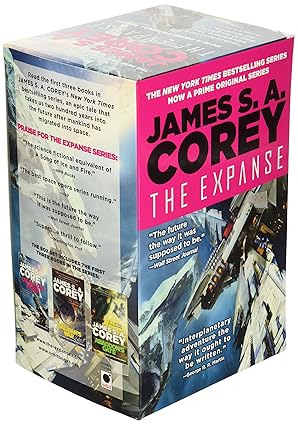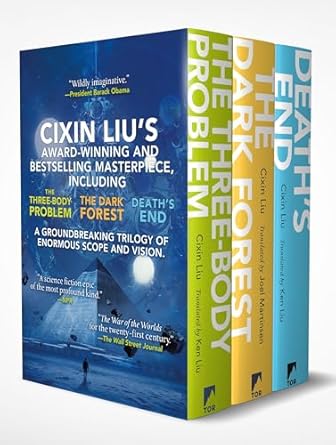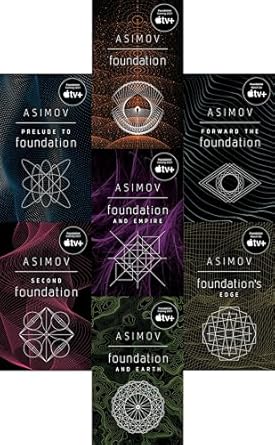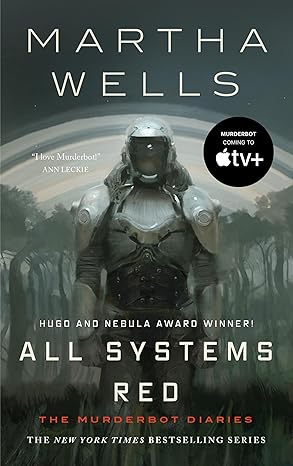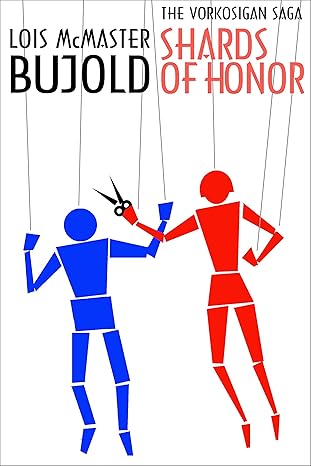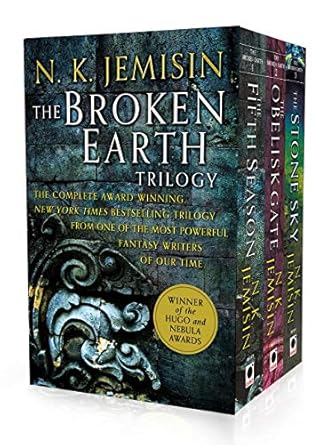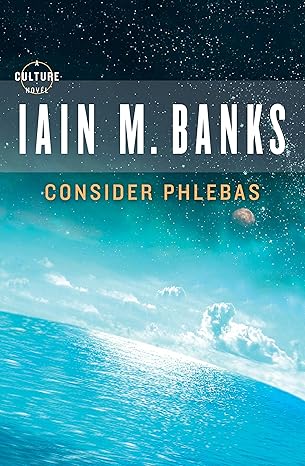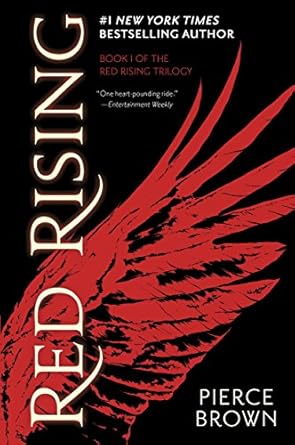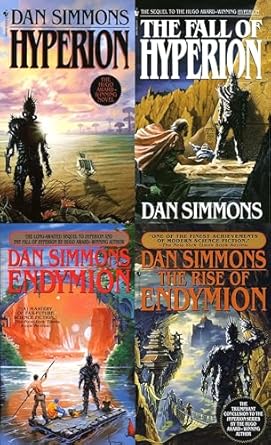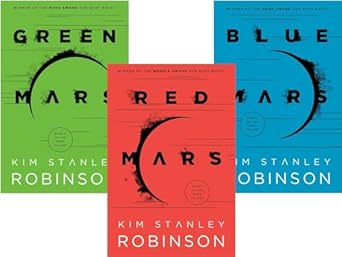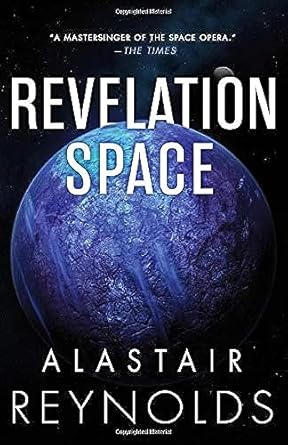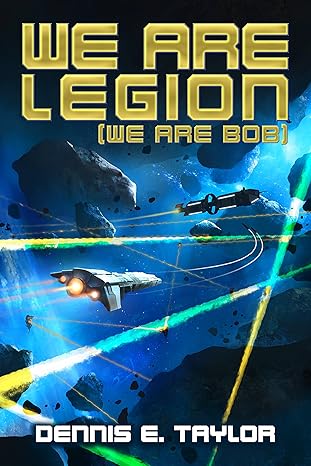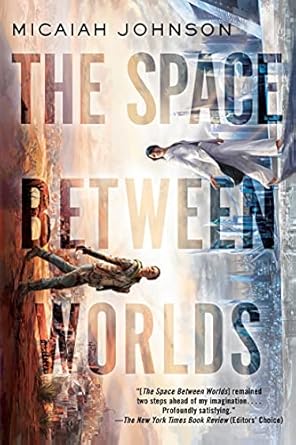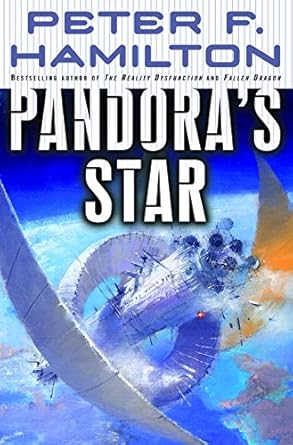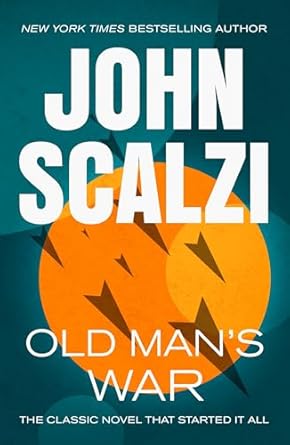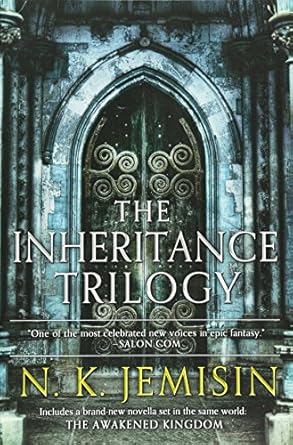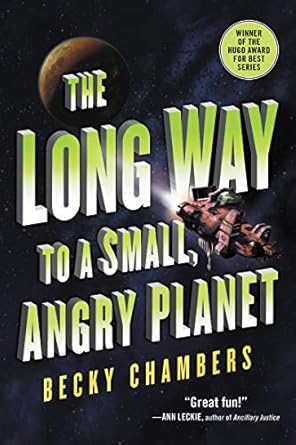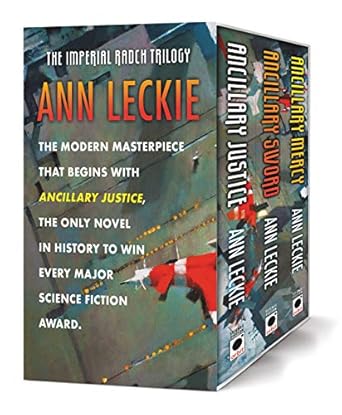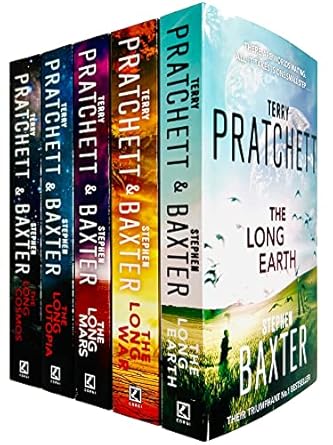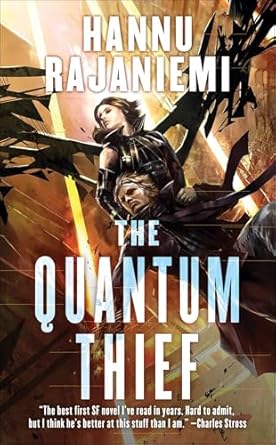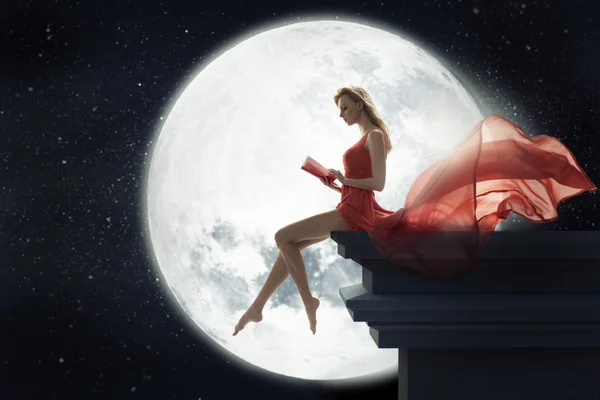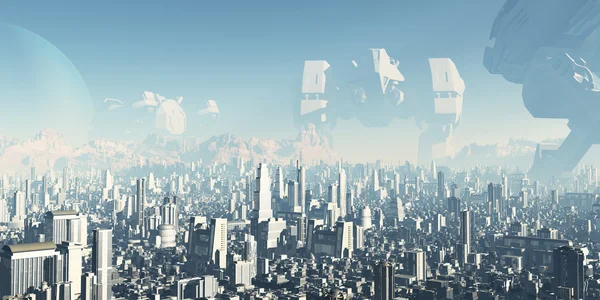Summary: In today's article, I have compiled 20 of the best sci-fi book series that I think are perfect for anyone looking to escape into fascinating worlds. Here are the top 3 picks:
- The Expanse Series by James S. A. Corey
- The Three-Body Problem Trilogy by Liu Cixin
- Foundation Series by Isaac Asimov
Sci-fi series let you explore imaginative worlds where science, technology, and humanity intersect. They dive into futuristic ideas, complex politics, and big questions about society and the universe. With each book, you get to follow characters through evolving stories filled with action, deep themes, and exciting escapes. Whether you enjoy space adventures or dystopian futures, there's something for everyone.
TOP 20: Best Sci-Fi Book Series
- The Expanse Series by James S. A. Corey
- The Three-Body Problem Trilogy by Liu Cixin
- Foundation Series by Isaac Asimov
- The Murderbot Diaries by Martha Wells
- Vorkosigan Saga by Lois McMaster Bujold
- The Broken Earth Trilogy by N.K. Jemisin
- The Culture Series by Iain M. Banks
- The Red Rising Saga by Pierce Brown
- Hyperion Cantos by Dan Simmons
- The Mars Trilogy by Kim Stanley Robinson
- Revelation Space Series by Alastair Reynolds
- The Bobiverse Series by Dennis E. Taylor
- The Space Between Worlds by Micaiah Johnson
- The Commonwealth Saga by Peter F. Hamilton
- Old Man's War Series by John Scalzi
- The Inheritance Trilogy by N.K. Jemisin
- The Long Way to a Small, Angry Planet Series by Becky Chambers
- The Imperial Radch Series by Ann Leckie
- The Long Earth Series by Terry Pratchett & Stephen Baxter
- The Quantum Thief Series by Hannu Rajaniemi
1. The Expanse Series
- Author: James S. A. Corey
- About: A space opera set in a future where humanity has colonized the solar system. The series follows a crew aboard the spaceship Rocinante as they uncover a conspiracy that could threaten humanity’s survival.
- Style of Writing: Fast-paced, gritty, with a mix of hard science and political intrigue.
- Length: ~2.5 million words (across 9 main novels and related short stories)
- Year Written: 2011–2021
- Emotional Impact: Strong emotional resonance, focusing on relationships and the effects of power.
- Difficulty Level: Medium to hard—requires attention to political and scientific concepts.
- Why Read It: If you enjoy immersive world-building, multi-layered characters, and gripping plots with high stakes.
2. The Three-Body Problem Trilogy
- Author: Liu Cixin
- About: A hard sci-fi trilogy about humanity’s first contact with an alien civilization, set against the backdrop of China’s Cultural Revolution. Explores themes of science, philosophy, and the future of humanity.
- Style of Writing: Dense, intellectual, and full of scientific concepts and philosophical reflections.
- Length: ~500,000 words (across three books)
- Year Written: 2008–2010 (translated to English in 2014)
- Emotional Impact: Leaves a lasting impact, making readers reflect on humanity's place in the universe.
- Difficulty Level: Hard—requires a solid understanding of scientific concepts, particularly physics.
- Why Read It: For a thought-provoking exploration of first contact and the nature of intelligence.
3. Foundation Series
- Author: Isaac Asimov
- About: A classic series focused on the rise and fall of galactic empires and the efforts to preserve knowledge during inevitable societal collapse.
- Style of Writing: Clear, methodical, and intellectual, with a focus on ideas over action.
- Length: ~900,000 words (across seven books)
- Year Written: 1951–1993
- Emotional Impact: More about intellectual stimulation than emotional depth, but it deeply reflects on civilization and history.
- Difficulty Level: Medium—dry at times but accessible.
- Why Read It: If you enjoy epic, philosophical sci-fi about society and the preservation of knowledge.
4. The Murderbot Diaries
- Author: Martha Wells
- About: Follows a self-aware security android who hacks its programming and becomes “Murderbot.” The series centers on its journey to understand its identity while protecting humans.
- Style of Writing: Snarky, humorous, and fast-paced with emotional depth despite the robotic protagonist.
- Length: ~100,000 words (across six novellas)
- Year Written: 2017–2021
- Emotional Impact: Surprisingly heartfelt, exploring themes of loneliness, identity, and self-worth.
- Difficulty Level: Easy—short novellas that are straightforward and engaging.
- Why Read It: A unique and endearing AI protagonist, combining humor and emotional exploration.
5. Vorkosigan Saga
- Author: Lois McMaster Bujold
- About: A space opera series following Miles Vorkosigan, a physically weak but incredibly clever military leader navigating political intrigue and family drama in a vast interplanetary empire.
- Style of Writing: Witty, character-driven, with humor, action, and political intrigue.
- Length: ~2.5 million words (across 17 books)
- Year Written: 1986–2019
- Emotional Impact: Strong emotional resonance with a focus on personal growth, relationships, and power.
- Difficulty Level: Medium—accessible writing with intricate political and character-driven plots.
- Why Read It: For fans of character-driven narratives with humor, adventure, and political drama.
6. The Broken Earth Trilogy
- Author: N.K. Jemisin
- About: Set in a world plagued by apocalyptic seismic activity, this trilogy follows a woman with earth-manipulating abilities navigating oppression, survival, and destruction.
- Style of Writing: Poetic, emotionally charged, and deeply layered with social and philosophical themes.
- Length: ~500,000 words (across three books)
- Year Written: 2015–2017
- Emotional Impact: Profound—explores powerful themes of family, survival, and societal oppression.
- Difficulty Level: Medium to hard—engagement with deep themes is required.
- Why Read It: If you enjoy emotionally charged, socially conscious sci-fi with an apocalyptic twist.
7. The Culture Series
- Author: Iain M. Banks
- About: A post-scarcity society where humans and advanced AI coexist in utopia. The series explores interventionism, power, and humanity’s evolution.
- Style of Writing: Dense, philosophical, and thought-provoking with vast world-building.
- Length: ~2 million words (across 10 books)
- Year Written: 1987–2012
- Emotional Impact: Awe-inspiring, with a focus on moral dilemmas and ethical questions about society and AI.
- Difficulty Level: Hard—complex world-building and philosophical themes.
- Why Read It: For those who love grand, speculative sci-fi about utopias, AI, and ethics.
8. The Red Rising Saga
- Author: Pierce Brown
- About: Set on a future Mars, this dystopian saga follows Darrow, a member of the oppressed lower class, who infiltrates the ruling elite to spark a revolution.
- Style of Writing: Fast-paced, gritty, with action and political intrigue.
- Length: ~600,000 words (across five books)
- Year Written: 2014–present
- Emotional Impact: High—delves into themes of sacrifice, revolution, and social justice.
- Difficulty Level: Medium—action-driven with philosophical undertones.
- Why Read It: For readers who love thrilling rebellions, political intrigue, and complex characters.
9. Hyperion Cantos
- Author: Dan Simmons
- About: Set in a distant future, this series follows seven pilgrims on their journey to the distant world of Hyperion, each sharing a personal tale of tragedy and mystery.
- Style of Writing: Literary, philosophical, with religious, political, and historical themes.
- Length: ~600,000 words (across four books)
- Year Written: 1989–1997
- Emotional Impact: Deep—examines human suffering, faith, and destiny.
- Difficulty Level: Hard—dense and philosophical with many layers.
- Why Read It: For fans of literary sci-fi with intricate storytelling and deep themes.
10. The Mars Trilogy
- Author: Kim Stanley Robinson
- About: This trilogy focuses on the colonization and terraforming of Mars, exploring the political, social, and environmental challenges humanity faces.
- Style of Writing: Detailed, scientific, with a focus on realism and social issues.
- Length: ~900,000 words (across three books)
- Year Written: 1990–1996
- Emotional Impact: Deep—explores humanity’s ambition, survival, and the complexities of colonization.
- Difficulty Level: Hard—requires attention to scientific details and political intricacies.
- Why Read It: For readers fascinated by the realistic challenges of space colonization and environmentalism.
11. Revelation Space Series
- Author: Alastair Reynolds
- About: A hard sci-fi series set in a future where humanity is scattered across the galaxy, grappling with ancient alien civilizations and mysterious technologies.
- Style of Writing: Dark, detailed, and dense with hard science fiction concepts, blending space opera with exploration of human nature.
- Length: ~1.2 million words (across five main books)
- Year Written: 2000–2007
- Emotional Impact: Strong—explores themes of survival, isolation, and existential risk.
- Difficulty Level: Hard—complex scientific details and intricate world-building.
- Why Read It: If you enjoy deep, thought-provoking space opera with an emphasis on hard science fiction and alien mysteries.
12. The Bobiverse Series
- Author: Dennis E. Taylor
- About: The series follows Bob, a man who dies and is turned into an AI, taking control of a spaceship to explore the galaxy. As he learns about the universe, his copies, or “Bobs,” explore different paths.
- Style of Writing: Light-hearted, humorous, and adventurous, with a focus on exploration and problem-solving.
- Length: ~600,000 words (across three main books)
- Year Written: 2016–2019
- Emotional Impact: Moderate—while fun and adventurous, it also explores questions about identity and the human experience.
- Difficulty Level: Medium—easy-to-read with a touch of philosophical depth.
- Why Read It: For a fun, quirky, and intelligent exploration of AI, space exploration, and humanity’s place in the universe.
13. The Space Between Worlds
- Author: Micaiah Johnson
- About: This series follows Cara, a woman who can travel between parallel universes. But the price is high—she must die in those alternate worlds to survive in hers. It explores identity, privilege, and survival.
- Style of Writing: Fast-paced, emotional, and thought-provoking, with a focus on social issues and identity.
- Length: ~100,000 words (single novel)
- Year Written: 2020
- Emotional Impact: High—explores identity, class, and the personal cost of survival in an intense, emotional way.
- Difficulty Level: Medium—while accessible, it’s layered with deep themes about self and society.
- Why Read It: If you enjoy alternate realities and want a book that challenges the idea of identity, class, and privilege in a captivating way.
14. The Commonwealth Saga
- Author: Peter F. Hamilton
- About: A sprawling space opera about the discovery of alien life and the intergalactic empire that begins to unravel in the wake of this revelation. It’s a story of politics, warfare, and human evolution.
- Style of Writing: Detailed, expansive, and packed with political intrigue and technological wonder.
- Length: ~1 million words (across two books in the saga)
- Year Written: 2003–2004
- Emotional Impact: Moderate—it delves more into societal and technological evolution than personal emotion.
- Difficulty Level: Hard—dense with political and scientific details.
- Why Read It: If you love sprawling space operas with rich world-building, intricate plots, and a focus on the future of humanity.
15. Old Man's War Series
- Author: John Scalzi
- About: This series follows John Perry, who joins the Colonial Defense Forces at 75 years old to fight in an interstellar war. The catch is, his mind is transferred into a young, enhanced body.
- Style of Writing: Fast-paced, humorous, and action-packed with a focus on character development and the human condition.
- Length: ~500,000 words (across six books)
- Year Written: 2005–2016
- Emotional Impact: Moderate—combines humor with a deeper exploration of aging, sacrifice, and what it means to be human.
- Difficulty Level: Medium—easy to follow, but with some complex themes about identity and military life.
- Why Read It: If you enjoy military sci-fi with humor, character-driven storytelling, and philosophical questions about age and humanity.
16. The Inheritance Trilogy
- Author: N.K. Jemisin
- About: A fantasy-sci-fi blend focusing on gods, power struggles, and family dynamics. The story follows Yeine Darr, who is thrust into a power struggle between gods and mortals in a volatile, magical world.
- Style of Writing: Rich, lyrical, and deeply emotional, with an emphasis on world-building and social themes.
- Length: ~200,000 words (across three books)
- Year Written: 2010–2011
- Emotional Impact: High—intense, with powerful themes of power, vengeance, and familial ties.
- Difficulty Level: Medium—intellectual, but with an accessible narrative style.
- Why Read It: If you love a mix of sci-fi and fantasy with complex characters and intricate political themes.
17. The Long Way to a Small, Angry Planet Series
- Author: Becky Chambers
- About: This series follows the ragtag crew of a spaceship as they travel across the galaxy, facing personal and collective challenges. It’s a character-driven space opera that emphasizes kindness and understanding.
- Style of Writing: Warm, uplifting, and focused on character interaction and relationships.
- Length: ~400,000 words (across three books)
- Year Written: 2014–2018
- Emotional Impact: High—heartfelt and optimistic, with an emphasis on belonging and found family.
- Difficulty Level: Easy—light and approachable with a focus on character and dialogue.
- Why Read It: If you enjoy character-driven sci-fi with a focus on relationships, diversity, and kindness.
18. The Imperial Radch Series
- Author: Ann Leckie
- About: This series follows Breq, the last surviving member of a starship's crew, as she seeks revenge against the entity responsible for her crew’s destruction. It explores themes of identity, power, and artificial intelligence.
- Style of Writing: Tight, introspective, and highly philosophical with a focus on identity and self-discovery.
- Length: ~300,000 words (across three books)
- Year Written: 2013–2015
- Emotional Impact: High—deals with themes of self-worth, vengeance, and the complexities of identity.
- Difficulty Level: Medium—requires attention to detail due to its philosophical and character-focused nature.
- Why Read It: For its unique narrative voice and its exploration of gender, identity, and AI.
19. The Long Earth Series
- Author: Terry Pratchett & Stephen Baxter
- About: A series exploring a multiverse of parallel Earths, where the discovery of this phenomenon leads to social, political, and scientific upheaval.
- Style of Writing: Light-hearted with Pratchett’s wit combined with Baxter’s more serious, hard sci-fi elements.
- Length: ~500,000 words (across five books)
- Year Written: 2012–2016
- Emotional Impact: Moderate—it’s more of an intellectual exploration with some emotional stakes.
- Difficulty Level: Medium—easy to read but layered with deeper ideas.
- Why Read It: If you’re fascinated by alternate realities and enjoy a blend of humor and serious sci-fi exploration.
20. The Quantum Thief Series
- Author: Hannu Rajaniemi
- About: A fast-paced, futuristic series following master thief Jean le Flambeur, who must navigate a complex world filled with quantum technology, memory manipulation, and interplanetary politics.
- Style of Writing: Complex, poetic, and filled with high-concept ideas about technology and society.
- Length: ~400,000 words (across three books)
- Year Written: 2010–2015
- Emotional Impact: Moderate—focuses more on intellectual stimulation than emotional depth, but still engaging.
- Difficulty Level: Hard—dense and requires careful attention to the sci-fi concepts.
- Why Read It: For fans of hard sci-fi who enjoy high-tech adventures with intricate plots and philosophical undercurrents.
Conclusion
If you're looking for the top sci-fi series to dive into, The Expanse Series, The Three-Body Problem Trilogy, and the Foundation Series are must-reads, in my opinion. Each offers something unique, from exploring a divided solar system to facing first contact with an alien race, and even preserving knowledge through the collapse of civilizations. Personally, I think these series deliver not only thrilling plots and incredible world-building but also get you thinking about bigger questions—about society, identity, and our place in the universe. Whether you're into space adventures, deep scientific ideas, or thought-provoking storytelling, these three will take you on a memorable ride through the world of sci-fi.

